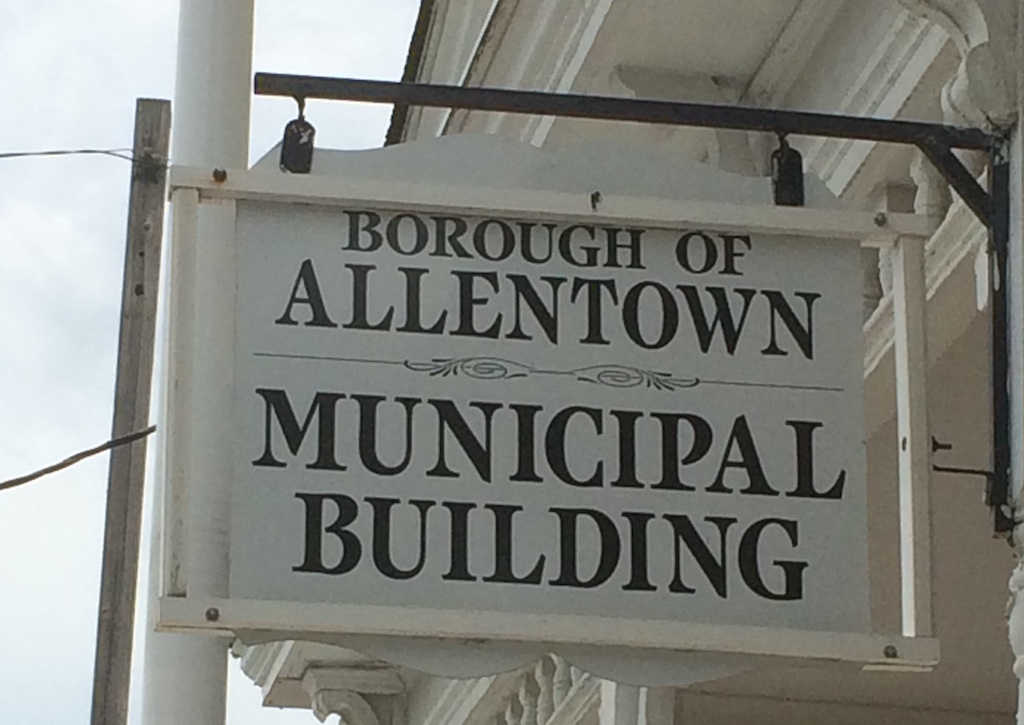ALLENTOWN – The provision of emergency services in Allentown, including the possibility of billing patients for first aid services, was a topic of discussion at the Borough Council on Oct. 10 when representatives of the Hope Fire Company and the Allentown First Aid Squad came before the governing body.
Steve Gomba, chief of the Hope Fire Company, which serves Allentown and Upper Freehold Township, reported that during the third quarter of 2017 (July through September), the fire company responded to 108 incidents. For the year, the fire company has responded to 313 incidents.
Gomba advised Mayor Greg Westfall and council members that the fire company “needs to advance plans for personal protective equipment. We have seven acceptable units in compliance (with standards) and 35 other firefighters who have non-compliant units.”
He said one set of turnout gear costs about $2,500 and includes boots, pants, a coat, a hood, gloves and a helmet. At $2,500 per set, 35 sets of turnout gear would cost the fire company $87,500.
“We need a plan moving forward. This is a regulatory and compliance issue,” Gomba said, adding that the fire company also needs defibrillators and thermal imaging cameras.
Gomba said a thermal imaging camera can cost between $5,000 and $10,000. He said the fire company will consider seeking grants to help acquire some of the needed equipment.
In a second presentation, Mike Conroy, the president of the Allentown First Aid Squad, told members of the governing body the organization is moving toward a system in which patients will be billed for services provided.
The first aid squad is partially supported through contributions provided by the Township Committee in Upper Freehold Township and the Borough Council in Allentown. This year, Upper Freehold is providing $80,000 and Allentown is providing $29,000, according to Conroy.
The squad is attempting to raise $45,000 through local fundraisers this year, according to Conroy, who said the organization has raised about $41,000 thus far. The squad’s operating budget for the year is $330,000, he said.
Volunteers respond to calls between 6 p.m. and 6 a.m. and paid employees respond to calls between 6 a.m. and 6 p.m. Annual staffing costs amount to about $130,000, Conroy said.
Looking ahead to what he said is a likely decision, Conroy explained how billing for services is expected to work. He said if a resident of Allentown or Upper Freehold Township receives services from the first aid squad, that individual’s insurance company will be billed.
He said the squad may receive a payment from the insurance company which may not cover the total amount billed. If that occurs, the patient will be billed for the balance, but if that Allentown or Upper Freehold Township resident does not pay the balance, the squad will write off the unpaid amount, he said.
In cases that do not involve a resident of Allentown or Upper Freehold Township, for example, if the first aid squad responds to a call for assistance in neighboring Robbinsville, the patient’s insurance company will be billed.
If the insurance company does not pay the bill in full, the patient will be billed for the balance. If that individual does not pay his portion, the bill will be sent to a collection agency, according to Conroy.
“We think that by moving to billing, which many squads around us have done, we can continue to deliver services,” he said.
In other news, Conroy reported that the squad replaced a 36-year-old stretcher with a new one that cost $15,000, plus $5,000 to retrofit an ambulance so the new stretcher could be used in that vehicle. He said additional defective gear needs replacement.
The first aid squad has expanded its membership to include volunteers who only want to drive a vehicle. He said seven members of the fire company have responded to that call for assistance and will undergo emergency vehicle operation training.
Any individual from the community who volunteers to be a driver only will receive training in cardiopulmonary resuscitation and basic first aid, Conroy said.
He said the first aid squad responds to about 725 calls for service on an annual basis. Not all of those calls would be subject to billing, according to the squad president, who estimated that about 325 calls per year would involve a response for which a bill could be generated.

